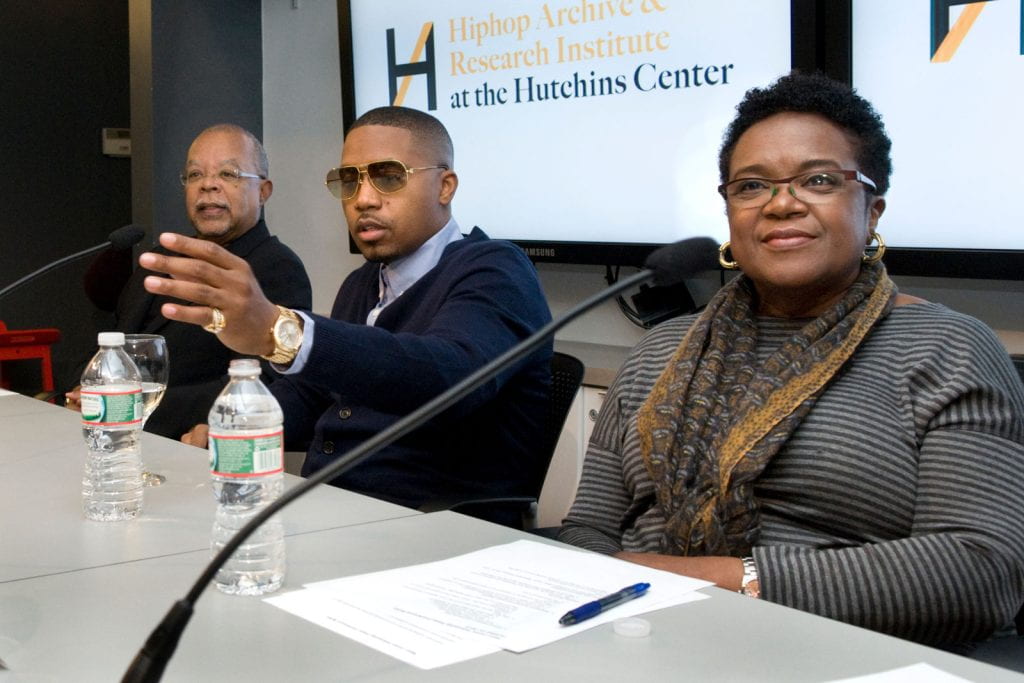In 2013 the Nasir Jones Hiphop Fellowship was founded in honor of the multi-platinum Def Jam Recordings artist known as Nas.
Throughout his career, Nas has symbolized the pursuit of excellence by combining artistic ability, social commentary, and creativity while giving expression to and representing the range of life’s challenges. The Fellowship’s mission is to facilitate and encourage the pursuit of knowledge, art, culture, and leadership through the exchange of artists and scholars in residence at the Du Bois Research Institute.
The Nasir Jones Hiphop Fellowship is the first academic fellowship named after a hiphop artist. It is intended for both scholars and artists who demonstrate exceptional capacity for increased scholarship and exceptional creative ability in the arts in connection with hiphop. Fellows are challenged to develop work and art, to paraphrase Nas, that “speaks through American youth rather than speaks about and to them.”
Press Announcement
Fellowship To Fund Scholars And Artists Who Demonstrate Exceptional Productive Scholarship And Exceptional Creative Ability In The Arts, In Connection With Hiphop
(July 12, 2013 – New York, NY) The two decade (plus) career of multi-platinum Def Jam Recordings artist Nas is at the heart of a joint announcement by the Hiphop Archive and the Hutchins Center for African & African American Research at Harvard University, to establish the Nasir Jones Hiphop Fellowship. The Fellowship will provide selected scholars and artists with an opportunity to show that “education is real power,” as it builds upon the achievements of those who demonstrate exceptional capacity for productive scholarship and exceptional creative ability in the arts, in connection with Hiphop.
The mission of The Hiphop Archive & Research Institute is threefold: to seek projects from scholars and artists that build on the rich and complex hiphop tradition; to respect that tradition through historically grounded and contextualized critical insights; and most importantly, to represent one’s creative and/or intellectually rigorous contribution to hiphop and the discourse through personal and academic projects. Personal projects of fellows may include manuscript projects, performance pieces, album work, curriculum planning, primary archival research, and exhibition preparation, among others.
“Having welcomed artists including Ninth Wonder and scholars including Mark Anthony Neal, The Hiphop Archive & Research Institute is uncompromising in our commitment to build and support intellectually challenging and innovative scholarship that reflects the rigor and achievement of Hiphop performance,” said Marcyliena Morgan, Professor of African and African American Studies at Harvard University and founder and director of The Hiphop Archive & Research Institute. “With the introduction of the Nasir Jones Hiphop Fellowship, we will continue to be the leading resource for those interested in knowing, developing, building, maintaining, and representing Hiphop.”
Professor Henry Louis Gates, Jr., the Alphonse Fletcher University Professor and Director of the Hutchins Center for African & African American Research, added, “Nas is a true visionary, and he consistently shows how boundaries can be pushed and expanded to further the cause of education and knowledge. The work of the Du Bois Institute is enriched by the addition of the Nasir Jones Hiphop Fellowship.”
Nasir Jones, or Nas, critically acclaimed for his lyrical skill, social analysis and commitment, has helped usher in an original form of hiphop debate and analysis that reflects on and represents urban youth angst and conflict as well as intelligence, confidence and ambition. A quintessentially honest artist, Nas has taken great risks in exposing his deepest vulnerabilities while still staying relevant to a wide audience. He has tackled both intense political issues and hardcore street topics. In doing so, he has inspired a generation. This Fellowship honors his work while supporting the work of others. Fellows are chosen by a selection committee comprising members of the Harvard University faculty.
Life is Good (released July 2012), the most recent album by Nas, was his third consecutive Def Jam album to debut at #1 on the Billboard 200 albums chart. It followed the releases of the RIAA platinum, Grammy®-nominated Hip-Hop Is Dead (December 2006), and the RIAA gold, Grammy®-nominated untitled album (July 2008).
The first full-length album by poet and rhyme-master Nas arrived in 1994, the RIAA platinum Illmatic (Columbia Records). 1996 brought the breakthrough double-platinum It Was Written (#1 R&B for 7 weeks, #1 pop for 4 weeks). The streak continued with the double-platinum I Am in 1999 (again #1 pop and #1 R&B). Subsequent albums by Nas included: the RIAA platinum Nastradamus (1999, #2 R&B, #7 pop); the platinum Stillmatic (2001, #1 R&B, #5 pop); the platinum God’s Son (2002, #1 R&B); and the platinum double-CD Street’s Disciple (2004, #2 R&B, #5 pop).
In addition to his successful career in music, Nas has pursued a career in motion pictures that began with his co-starring role (alongside DMX) in 1998’s crime drama Belly, a film by director Hype Williams (with whom Nas has done several video clips). Subsequent appearances include Albert Pyun’s action crime thriller Ticker (2001, with Tim Sizemore and Steven Seagal); Carl Seaton’s Sacred Is the Flesh (2001, also co-written by Nas); a cameo as himself in Boaz Yakin’s comedy Uptown Girls (2003, with Brittany Murphy and Dakota Fanning); Lawrence Page’s Murda Muzik (2004, with Ron Artest and Chinky); the fictional hip-hop group bio-pic The Vapors (2008, with an all-star cast of Roxanne Shanté, Kool G Rap, Marley Marl, Biz Markie, and others); and the CBS tv hit series, Hawaii Five-O.
The Hiphop Archive & Research Institute was officially established at Harvard University in 2002 under the direction of Professor Marcyliena Morgan to support and establish the emerging research and scholarship devoted to the knowledge, art, culture, materials, organizations, movements and institutions developed by those who support and follow hiphop. The Hiphop Archive & Research Institute organizes and develops collections, initiates and participates in research activities, sponsors events and acquires material culture associated with hiphop in the U.S. and throughout the world.
Named after William Edward Burghardt Du Bois who, in 1895, was the first African American to receive a Ph.D. from Harvard University, the W.E.B. DuBois Center for African & African American Research is the nation’s oldest research center dedicated to the study of the history and culture of Africans and African Americans. The Institute was established in 1975 to sponsor fellowships that would facilitate the writing of doctoral dissertations in areas related to Afro-American Studies. In 2013, the W.E.B. DuBois Institute became the Hutchins Center for African & African American Research. Today, the Institute awards up to twenty fellowships annually to scholars at various stages of their careers in the fields of African and African American Studies, broadly defined to cover the expanse of the African Diaspora. The Hutchins Center’s research projects and visiting fellows form the nucleus around which revolve an array of lecture series, art exhibitions, readings, conferences, and archival and publication projects.
For more information about this and other Fellowship opportunities, including application information, please visit http://hutchinscenter.fas.harvard.edu/fellowship-program.
For more information on the research and public events of the Hutchins Center, please visit http://hutchinscenter.fas.harvard.edu.

